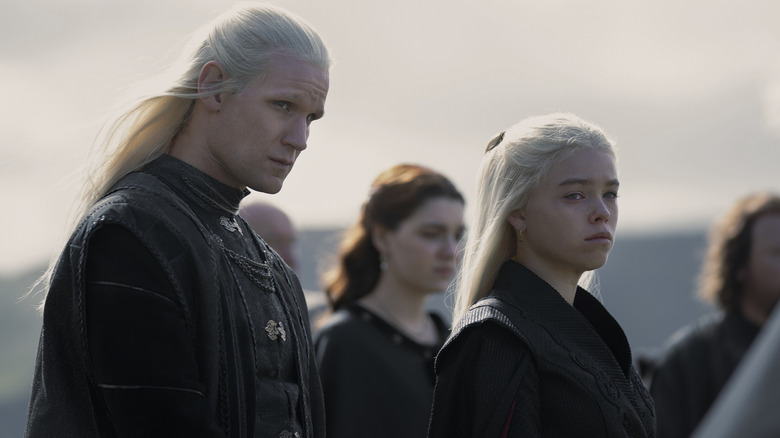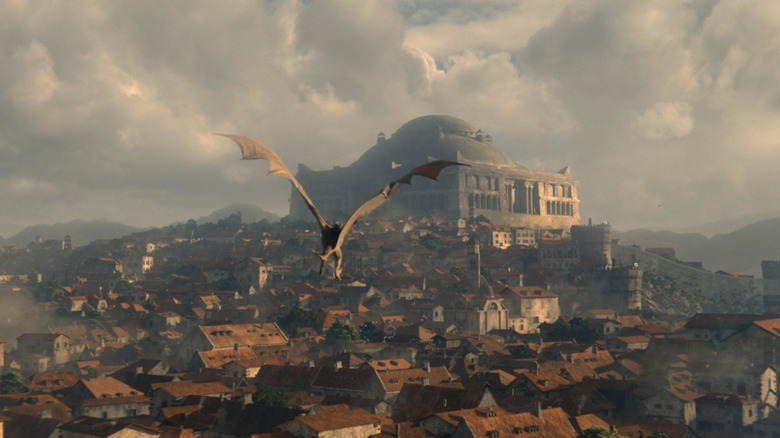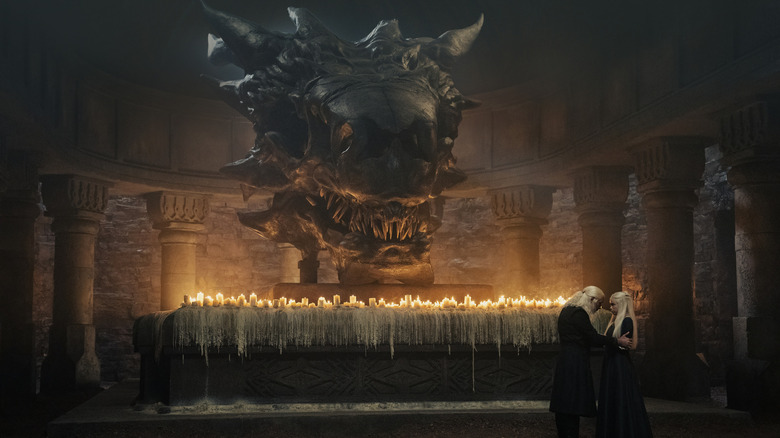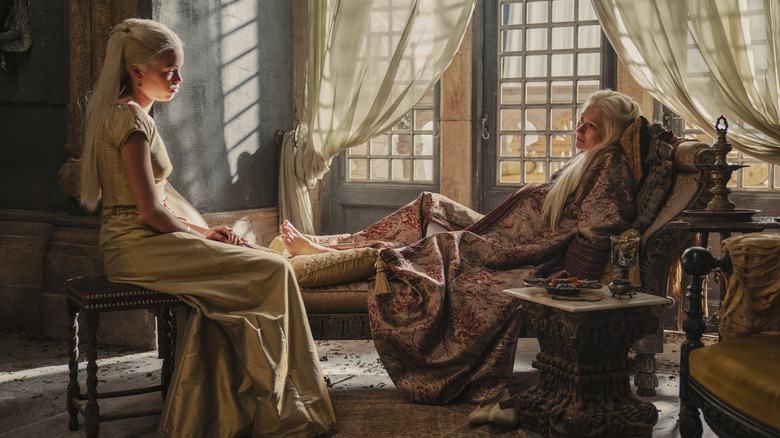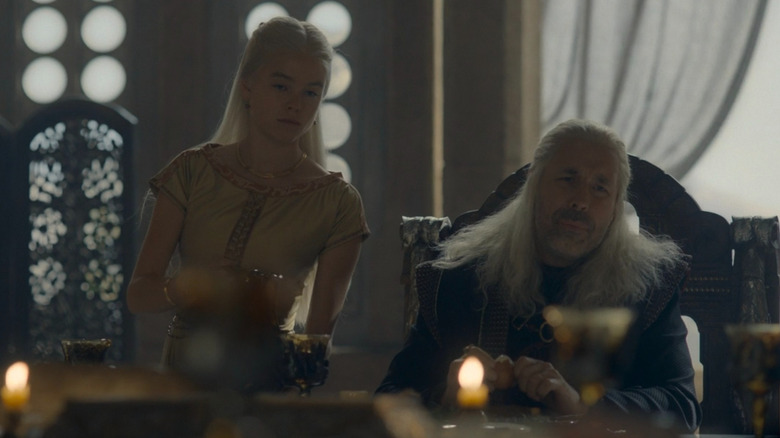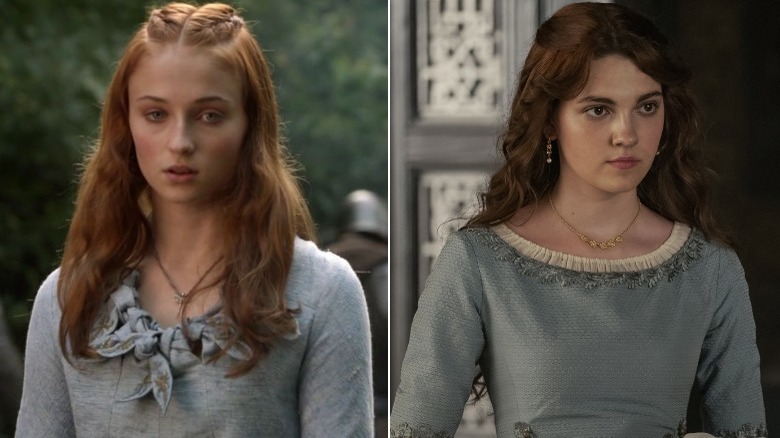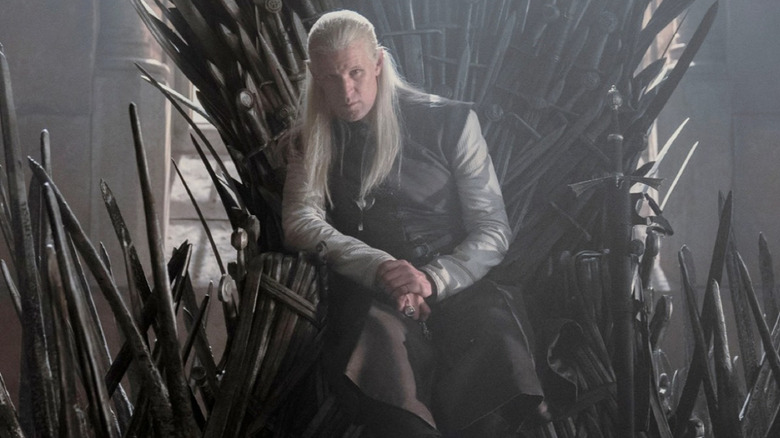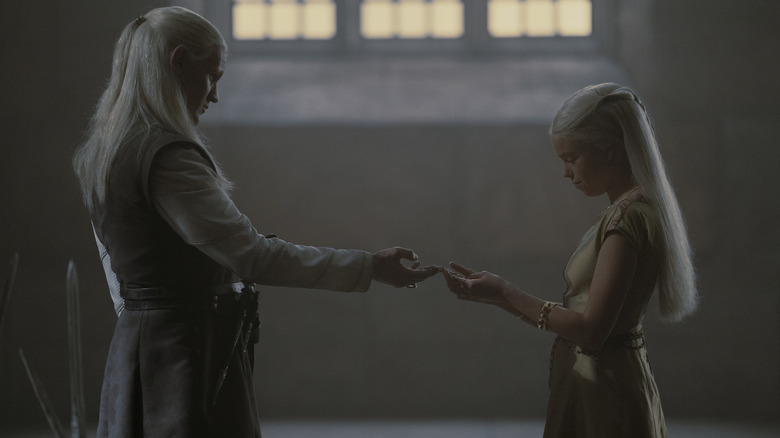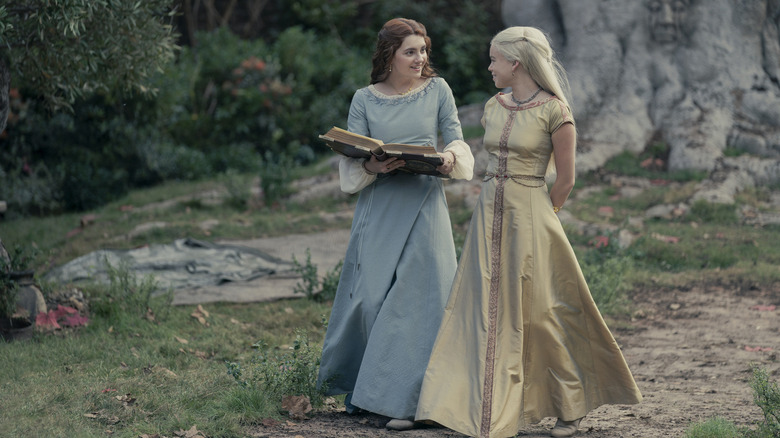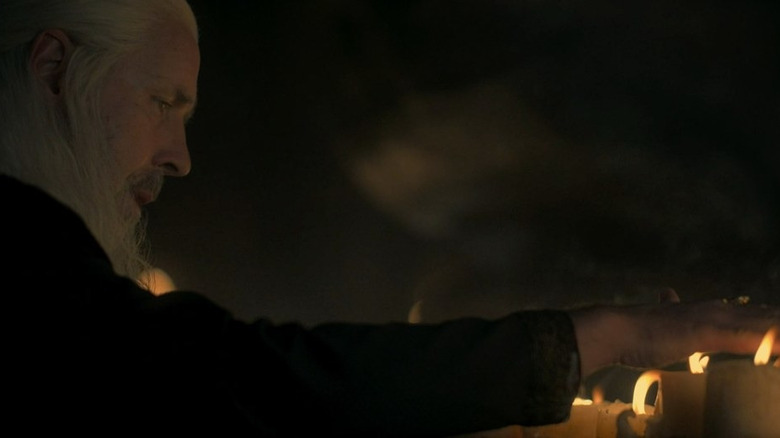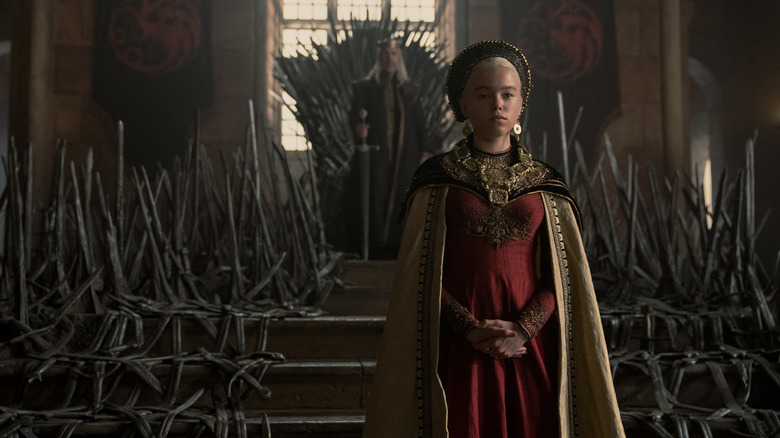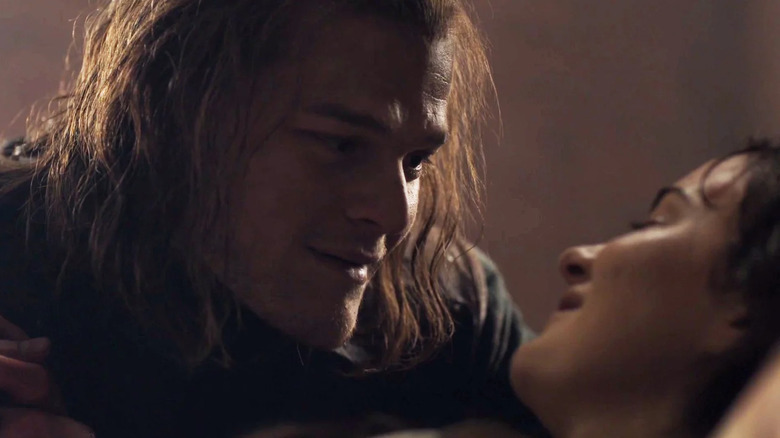11 Game Of Thrones Parallels In The House Of The Dragon Premiere
A royal family at the height of its powers, political rivalries threatening to tear the realm apart, and a blonde Targaryen princess with a good claim to the throne? If I didn't know any better, I'd say that "House of the Dragon" has too much in common with its predecessor, "Game of Thrones." Luckily, I've been paying enough attention to catch the many, many times that the creatives behind the new HBO series have pointed out the differences between the original and its prequel.
"House of the Dragon" might be sending us back to Westeros, but we're entering a very different era of this troubled realm — just take a look at the Iron Throne! Or the many dragons soaring through the sky. But just because these are different stories, doesn't mean the prequel isn't packed with references to the eight-season juggernaut that made its existence possible. "House of the Dragon" has plenty in common with "Game of Thrones," and it's certainly not a coincidence.
History has a way of repeating itself, and George R. R. Martin has always been honest about the fact that he takes inspiration directly from historical events. Despite all of its dragons and prophecies, the world of Westeros has a lot in common with our own, including the way that moments in time have a way of paralleling others. The first episode, "Heirs of The Dragon," was working overtime to situate us in a new era of Westeros and at the same time, hinting at the ways this story will get purposefully familiar. Below are some of the parallels you might have missed from the premiere episode of "House of the Dragon."
Dragons soaring over Kings Landing
After a brief history lesson on the state of the royal line of succession, we are reintroduced to Westeros and, more specifically, to King's Landing — where a good chunk of this new story will take place. You'll remember this as the capital of the seven kingdoms, home of the Iron Throne aka the city that Daenerys Targaryen will eventually reduce to ash. It's hard to look at those red rooftops and not remember the ringing bells as Dany broke bad and unleashed her fury on the common people — especially since "House of the Dragon" takes special care to remind us of that fateful finale.
Princess Rhaenyra (Milly Alcock) flies over Kings Landing in shots that are very reminiscent of Daenerys taking the city. It feels all the more purposeful because this premiere episode is directed by "Thrones" alum and "The Bells" director Miguel Sapochnik. On both occasions, he draws special attention to the people on the ground, with a dragon soaring overhead. When it was Dany, they marveled and screamed in terror. But 172 years before her, dragons are a common occurrence and Targaryens are heralded rulers. Nobody turns their faces to Rhaenyra with dread — in fact, barely anyone looks up at all!
Targaryens, dragons, and greatness
Speaking of familiar places, Rhaenyra's flight ends with us getting a glimpse at the dragon pits. When we saw them in "Game of Thrones," they were absolute ruins — and not just because of Daenerys's descent into madness. The dragon pits had fallen apart because there was no longer a need to maintain them. But at this point in time, their infrastructural glory is a testament to the current greatness of the Targaryen rule. Ironically, this will also play a role in their dynasty's downfall. As Daenerys once told Jon, dragons were not meant to be confined. The pits stunted their growth and eventually, they died off.
"They filled people with wonder and awe, and we locked them in here. They wasted away. Grew very small. And we grew small as well. We weren't extraordinary without them. We were just like everyone else.
This sentiment is later echoed by Rhaenyra, almost word-for-word when her father asks her to look at the skull of the infamously large Balerion the Dread. She tells him, "Everyone says Targaryens are closer to gods than to men, but they say that because of our dragons. Without them, we're just like anyone else."
Arya and Rhaenyra have a lot in common
A medieval fantasy word without misogyny? That's practically unheard of! But just because Westeros refuses to care about women, doesn't mean they won't find ways to carve out a corner of the world for themselves. We saw this time and time again in "Game Of Thrones," as badasses like Daenerys Targaryen, Cercei Lannister, Margaery Tyrell, and Brienne of Tarth did their best to shape their own futures. But before we got to know all of them, we were introduced to young Arya Stark, defying everything that her mother and septas tried to instill because she knew herself better than they ever could. Now, Rhaenyra Targaryen is following a similar path. At the earliest opportunity, these fierce young women tell us exactly who they are and what they want from life.
Even though Ned Stark placated his daughter with sword fighting lessons, he had no illusions about Arya's role as a highborn lady. When she asked if she might ever become lord of a holdfast, he affectionately laughed her off and spoke of a future where she'd marry a lord and give him sons that would be knights and princes. Arya didn't miss a beat in telling him, "No. That's not me."
Rhaenyra shares a very similar moment with her mother, Aemma (Sian Brooke), who speaks of the birthing bed as a woman's battlefield. In return, Rhaenyra says, "I'd rather serve as a knight and ride to battle and glory." Just like Arya, she's met with a fond laugh. While it sucks to see her dream laughed at, that's no reason to give up hope. After all, we know how things shook out for the youngest Stark girl...
The importance of cupbearing
Arya Stark's training begins the day that she leaves Winterfell. Before meeting the Faceless Men, she learns about the harsh way of the world, the cruelty of the royal family, the basics of sword fighting, and what it means to survive. And somewhere in the middle of that, she learns a bit about politics. Arya spent a season in the service of Tywin Lannister, serving as his cupbearer. Sitting in on his council meetings allowed her to track her family's progress in the war and absorb some sage advice from the Lord of Casterly Rock. In "HotD," Rhaenyra serves as cupbearer to her father, King Viserys (Paddy Considine), quietly listening as the small council makes decisions that impact the entire realm.
Cupbearer is an interesting role: in some ways, it's an honor — an invite to the room where it happens, with a front-row seat to the decision-making! But in practice, it looks like a blow to the ego. Pouring wine for lords who hardly register your existence? Not to mention the fact that Arya fills the position while being held as a prisoner, and Rhaenyra is made cupbearer before anyone considers her an actual possibility as heir to the throne.
While his job was a little different than cupbearing, Jon Snow had a similar crisis when he was made the Lord Commander's steward. The idea of emptying chamber pots made him throw a hissy fit, until Samwell Tarly wisely pointed out that Mormont made his a steward to keep him close: "He wants to groom you for command." This position is, above all an opportunity to learn. By the end of the episode, Rhaenyra is heir to the throne. Hopefully, all that time pouring wine will pay off, as she prepares to rule the seven kingdoms.
Every Arya needs a Sansa
Yet another thing that Rhaenyra and Arya share is their own personal foils: Sansa and Alicent (Emily Carey). Their fellow highborn ladies are better adjusted to what's expected of them, and serve their role with a much more docile and timid nature. But we get some hints that Alicent, like Sansa, may have second thoughts about doing as she's told, as she slowly comes to understand how much those expectations will weigh on her.
Sansa was jerked from one engagement situation to another — Joffrey Baratheon, Tyrion Lannister, Robin Arryn, and eventually, Ramsay Bolton. That last one was arranged by an ambitious schemer who expected her to employ some seduction techniques. Sound familiar? Otto Hightower (Rhys Ifans) is radiating some serious Littlefinger energy as a small council manipulator and we later learn that as a second son, he's taken it upon himself to better his family status. Poor Alicent is caught in the middle and grows increasingly anxious because of it. That anxiety is well-placed, as we learn when he orders her to go "comfort" the king.
Chilling on the Iron Throne
Daemon Targaryen (Matt Smith), our new problematic fave, has one hell of an introduction. After being discussed in the small council meeting where everyone makes him out to be a dangerous wildcard, Daemon proves them all correct in the most badass way possible. He reunites with his beloved niece Rhaenyra in the throne room, where he casually lounges on the Iron Throne. His reputation as the Rogue Prince really says it all.
You know who else once sat on the Iron Throne, much to the distress of an honorable Westorosi lord? Jaime Lannister! Another swaggering warrior with a cool nickname and controversial reputation. But like the Kingslayer, we soon learn that there's more to Daemon than meets the eye. When he's not busy dismembering criminals or daydreaming about becoming king, he might be found in a brothel, pouting under a blanket because he's sad about being replaced.
Ties to Old Valyria
During both the throne room scene and Daemon's therapy sesh in the brothel, we hear some mentions of Valyrian steel. This special metal played a crucial role in "Game of Thrones" because it was a rare weapon capable of killing White Walkers. But Valyrian steel was prized way before the Long Night marched on Westeros. Legend says Valyrian steel is forged in dragon fire and infused with magic: as a remnant of the once great Old Valyria (the empire where the Targaryens originated), its quality is unparalleled.
Only some of the richest families in Westeros have a Valyrian steel sword in the family, passed down through the generations. The Targaryens have multiple: including Dark Sister, wielded by Daemon, and Blackfyre, owned by King Viserys. Rhaenyra gets some Valyrian steel of her own in the premiere, courtesy of Daemon who gifts her with a necklace. Later, her father hands her the Valyrian steel dagger that Arya will eventually use to kill the Night King.
Another hint at old Valyria is all the High Valyrian spoken in this episode, most frequently between Daemon and Rhaenyra. In "Thrones," this was a rarity: other than a few folks in Essos, only Daenerys and her bestie/translator Missandei knew the language. But since every other character in this prequel series has Targaryen blood, expect to hear lots more threatening words in this fictional language.
Admiration for Nymeria and Visenya
As the princess of the realm, Rhaenyra is tasked with knowing the history of Westeros. Though studying is boring and she would prefer to spend her time eating cake on dragonback (which sounds like a choking hazard), she's still able to recite the tale of Nymeria, the warrior princess of the Rhoynar who saved her people from being conquered. We later learn that Rhaenyra has a thing for warrior Pprincesses when her mother reveals that she picked out the name Visenya for her potential little sister. Both of these historical figures also earned namedrops in "Game of Thrones," and lots of admiration from young Arya Stark. So who exactly are Nymeria and Visenya?
/Film has already done a deep-dive on the story of Nymeria (whom Arya named her direwolf after) but to sum it up, she was a princess who ruled the river city of Ny Sar until it was overthrown by Valyrians. To save her people, she loaded them up on a massive fleet of 10,000 ships and sailed away from Essos, eventually touching down in Dorne. She married Lord Mors Martell and they took ruled the kingdom together. Then, to show her people that the time for running was over, Nymeria burned her fleet.
She's the perfect heroine for Arya and Rhaenyra, not just because she ruled as a warrior queen, but because she influenced the progressive rules of Dorne: one of the few places in Westeros where women are given agency. The girls also share a fondness for another warrior queen from history: Visenya (an ancestor of Rhaenyra's), who conquered Westeros alongside Rhaenys and their brother-husband (ew) Aegon the Conqueror. Visenya is the original wielder of Dark Sister and has a reputation for being a fierce and feared warrior.
Fireproof Targaryens
The time has come to rehash the age-old "Game of Thrones" argument: are Targaryens fireproof? Ever since Daenerys stepped into a pyre and walked away from the ashes with three baby dragons, we've had reason to believe that she's entirely resistant to heat. But George R.R. Martin has always argued otherwise. He attests that Targaryens are not immune to fire, but the birth of Daenerys' dragons was a one-time, miraculous occurrence caused by all the blood magic at play. But that doesn't make sense, George — how do you explain all those boiling baths she took in season 1??
The real reason that this question has no obvious answer is that the books differ from the show. In season 6, Daenerys once again survives a massive fire when she kills a temple full of khals by burning it down and emerging unscathed. This doesn't happen in Martin's books (at least not that we know of, since they haven't been finished).
At the end of "Heirs of the Dragon," King Viserys is seen holding his hands over candle fire for much longer than your average person could comfortably do. Is this a hint at Targaryen heat immunity? Or just a wink to the audience? For Viserys' sake, hopefully, it's the latter. His maester's idea of healing his weird back wound was cauterization but if he can't be burned, then who knows what terrible medieval health procedure they'll turn to next!
A Song of Ice and Fire
The big reveal of the first episode comes at the very end, when King Viserys tells Rhaenyra that the motivation behind Aegon's conquest of Westeros was a dream that he called, "A Song of Ice and Fire." Does that title sound familiar? That also happens to be the name of Martin's book series, from which "Game of Thrones" takes its story. The title also gets a shoutout in the series finale, when another character speaks it aloud.
After all the chaos goes down, a newly anointed Maester Samwell Tarly presents Tyrion Lannister with a thick book. "What's this?" the last surviving Lannister asked him. In response, Sam turned to the camera, winked at the audience, put on some cool shades, and said: "A Song of Ice and Fire."
... Okay, fine, that's not what happened. But it might as well have. He does in fact give the book that very meta name, explaining that it is "Archmaester Ebrose's history of the wars following the death of King Robert." So I guess Aegon had the power to predict history book titles.
Promise me
After Viserys explains the prophecy, he tasks his daughter with protecting and passing on this family secret: "Promise me this, Rhaenyra. Promise me." This directly echoes a request that Lyanna Stark will make in 200 years, when she lays on her death bed having just given birth to Jon Snow, aka Aegon Targaryen. Speaking to her brother minutes before taking her final breath, she begs him to protect her secret — to protect her newborn son. "Promise me, Ned. Promise me," she says.
This brings us full circle! Because Ned protected Jon, parentage, and all, he was able to aid in the threat of the White Walkers and the Night King. We don't actually know how Rhaenyra's promise works out, though. Will she pass down the prophecy? Will it reach Jon's father, Rhaegar Targaryen? Did he tell Lyanna, who passed it on to Ned? Is that why he's always grumbling about winter coming? Or does Aegon's dream get lost in the shuffle of time? We'll have to see where Rhaenyra's story leads to find out.
